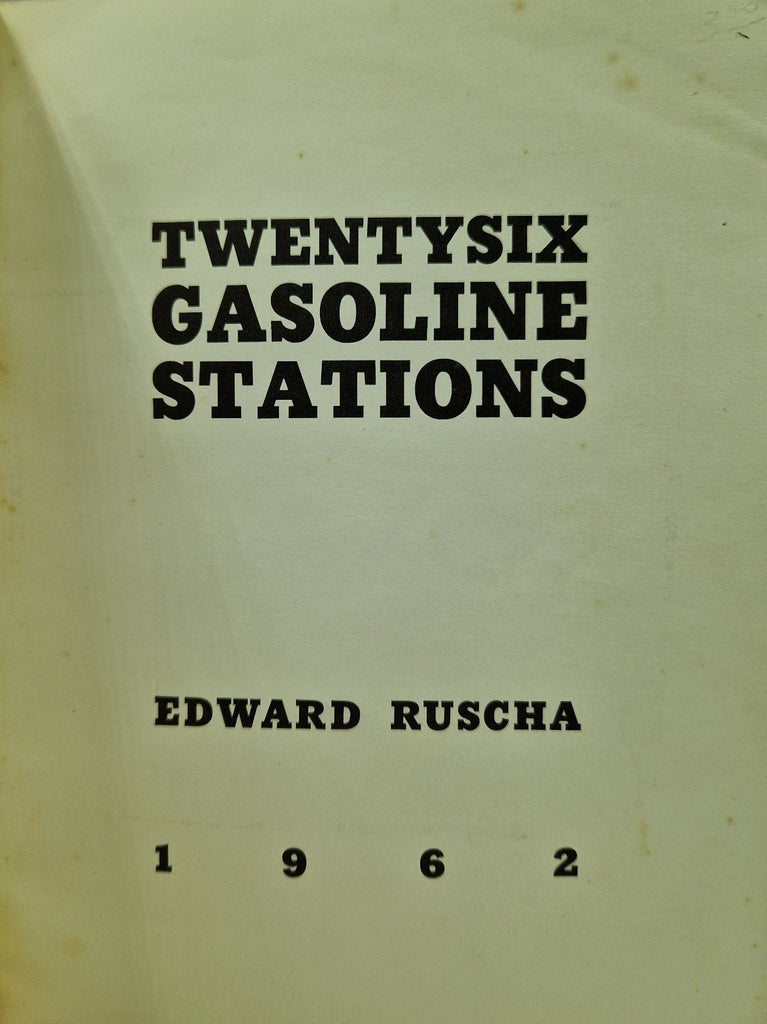Twentysix Gasoline Stations
RUSCHA, Edward





Alhambra, California National Excelsior Press. April 1963.
First edition, number 209 of 400. Unpaginated, pp [48]. Original printed wrappers and with the original (and rare) glassine wrapper. Some slight spotting to edges of covers and a short blue biro mark to glassine on lower cover and a small spot on upper cover but overall in very good condition and Toning to edges and spine, crease to lower cover, head and foot of spine very slight chipped but overall in very good condition. Internally near fine.
Twentysix Gasoline Stations is Ruscha's first book and widely regarded as the first modern artist's books. It consists simply of black and white photographs and brief captions stating the name of the petrol company and location of the station. The book's origins lie in Ruscha's long drives from California to his parents' home in Oklahoma. It sounds dull and it is meant to be, combining as Johanna Drucker says, "the literalness of early California pop art with a flat-footed photographic aesthetic informed by minimalist notions of repetitive sequence and seriality". Ruscha himself explained how he wanted "absolutely neutral material. My pictures are not that interesting...my book is more like a collection of readymades". He wanted, he said, "to be the Henry Ford of book making". This car imagery, combined with the gasoline stations have led some to see the book as a photographic version of a road movie - and Ruscha certainly draws on the gas station's central place in American popular culture. But Ruscha, brought up a Catholic, has lent his support to a more serious reading which sees his journey home through these stations as a form of religious journey, a modern, secular Stations of the Cross: "there is a connection between my work and my experience with religious icons". This sense of a pilgrimage with a defined endpoint is reinforced by Ruscha's decision to use as his last image a gasoline station owned by Fina.
First edition, number 209 of 400. Unpaginated, pp [48]. Original printed wrappers and with the original (and rare) glassine wrapper. Some slight spotting to edges of covers and a short blue biro mark to glassine on lower cover and a small spot on upper cover but overall in very good condition and Toning to edges and spine, crease to lower cover, head and foot of spine very slight chipped but overall in very good condition. Internally near fine.
Twentysix Gasoline Stations is Ruscha's first book and widely regarded as the first modern artist's books. It consists simply of black and white photographs and brief captions stating the name of the petrol company and location of the station. The book's origins lie in Ruscha's long drives from California to his parents' home in Oklahoma. It sounds dull and it is meant to be, combining as Johanna Drucker says, "the literalness of early California pop art with a flat-footed photographic aesthetic informed by minimalist notions of repetitive sequence and seriality". Ruscha himself explained how he wanted "absolutely neutral material. My pictures are not that interesting...my book is more like a collection of readymades". He wanted, he said, "to be the Henry Ford of book making". This car imagery, combined with the gasoline stations have led some to see the book as a photographic version of a road movie - and Ruscha certainly draws on the gas station's central place in American popular culture. But Ruscha, brought up a Catholic, has lent his support to a more serious reading which sees his journey home through these stations as a form of religious journey, a modern, secular Stations of the Cross: "there is a connection between my work and my experience with religious icons". This sense of a pilgrimage with a defined endpoint is reinforced by Ruscha's decision to use as his last image a gasoline station owned by Fina.
